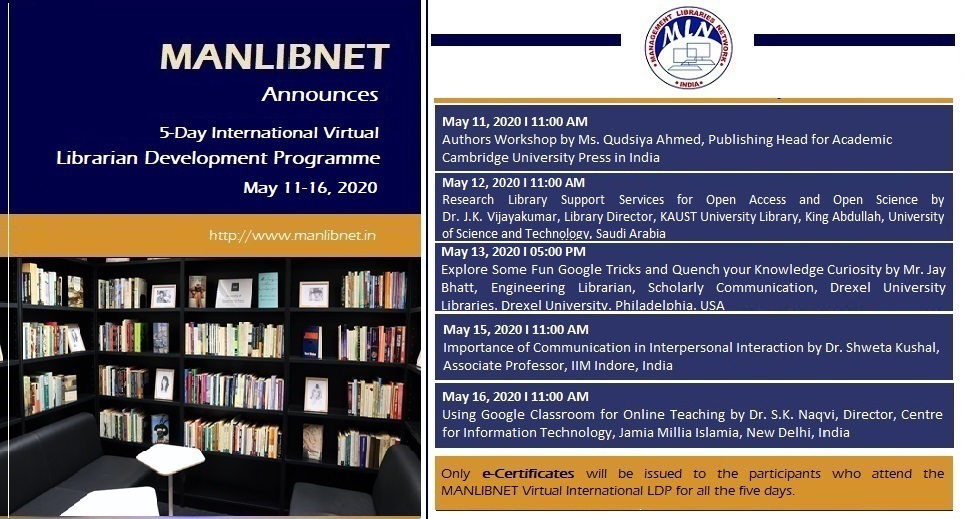The Management Libraries Network [MANLIBNET] Conference
India is a country that has many distinguished schools devoted entirely to management studies. In the early 2000s it became evident that these schools needed a conference devoted entirely to their own activities. The MANLIBNET conferences were born.
The first MANLIBNET conference was held in 2008, at the BRCM School of Management in Surat. Since then, further conferences have been organized, mostly annually, but in some years there have been more than one conference.
Owing to the Covid-19 pandemic, MANLIBNET was obliged to hold the 2020 conference virtually – this had not been attempted previously. Appropriately enough, the theme of the conference was International Virtual Librarian Development. It took place over five days, from 11th May to 16th May.

1700 academics and librarians from across the world registered for the conference. The countries represented included Bangladesh, Portugal, Saudi Arabia, various South American countries, the United Arab Emirates, the USA and of course India. The speakers were also recruited from different institutions and countries.
The sessions were moderated by Dr M G Sreekumar, Chief Librarian & Information Officer at IIM Calcut, who is the current President of MANLIBNET and Dr Akhtar Parvez, the General Secretary of MANLIBNET. Dr Sreekumar is a founding member of Cambridge University Press’s South Asian Librarian Advisory Board and is also one of two South Asian representatives on CUP’s Global Librarian Advisory Boards
An ambitious conference programme was developed. It began with a publishing awareness workshop led by Qudsiya Ahmed, Head of Academic Publishing and Gunjan Hajela, Academic Marketing Manager at Cambridge University Press India. The workshop employed Zoom technology and attracted 340 participants.
The workshop focused on the protocols of academic publishing. It guided the audience through the formal conventions of how to write and submit academic articles for publication. Qudsiya gave a brief history of Cambridge University Press’s long legacy and described how it continues to pioneer new approaches to academic publishing globally. She then focused especially on the needs of Indian researchers. The workshop went on to guide the audience through the publication process.
Participants were provided with guidelines for preparing manuscripts, which also included suggestions for writing precise proposals and succinct cover letters to send to prospective publishers. This was followed by explanations of the issues academic authors need to address in order to get their work accepted for publication, including a discussion on ‘responsible and ethical’ research, the importance of correct and accurate referencing, how to present citations, obtain permissions and copyright clearances and how to avoid allegations of plagiarism. There was a detailed discussion about peer review.
Gunjan joined the conference from Canada (where he had been marooned following the global lockdown) to give a short presentation on key initiatives currently being developed by Cambridge University Press. These included extending complimentary access to more than 700 key textbooks to academic institutions globally in the wake of the pandemic. He also described Cambridge Open Engage and the Cambridge Read & Publish model, offered a brief overview of Cambridge Core.
Qudsiya also held another workshop designed to raise author awareness. This was delivered in collaboration with Maulana Azad National Urdu University, Hyderabad, and organized by Dr Akhtar Parvez. It attracted more than 150 participants. It was considered to be very successful; consequently, Dr Parvez has asked for a repeat workshop, to be conducted later this year.
Other sessions at the event included a presentation on the importance of Open Access and Open Science by Dr V. J. Vijayakumar, Library Director at KAUST University, Saudi Arabia (also a member of the Cambridge Global Librarian Advisory Board). Jay Bhatt, the Liaison Librarian at Drexel University, USA, described techniques for retrieving information using Google Advanced Search and other effective search strategies; and Dr Shweta Kushal, Associate Professor, IIM Indore spoke on the importance of communication in interpersonal interaction.
Maintaining the momentum of a five-day-long virtual conference was a considerable achievement.
Cambridge University Press is happy to arrange workshops for authors and/or librarians upon request.





